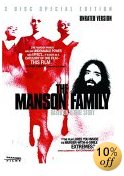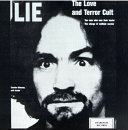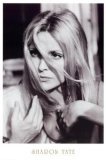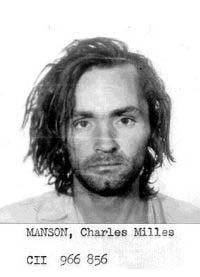|
Early Life In Kentucky, in 1918, Kathleen "Kathy" Maddox was the youngest of three children born to Nancy and Charles Maddox. She She ran away from her strict Fundamentalist Christian home. when she was 15 years old to escape her cold, strict, and oppressive family life. The young alcoholic runaway was only 16 years old when she gave birth on November 12, 1934, at 4:40 p.m., in the Cincinnati General Hospital, Cincinnati, Ohio. The official name on his legal birth certficate was “No-name Maddox” even though his mother had decided to call to call him Charles Milles and had this placed on his unofficial "souvenir" birth certificate The young irresponsible mother forgot to pick her young son up at the babysitters. Once she him to a barmaid for a pitcher of beer (his uncle found him days later). Charlie never met his father, "Colonel Scott," a 24-year-old transient laborer from Ashland, Kentucky. He was a working on a dam near Cincinnati but made a quick exit when he discovered his teenage sex partner was pregnant. The Manson name came from William Manson, 24, who his mother briefly married shortly after his birth. Even though Manson could barely remember him, this is the man he considered to be his father.
In 1936 the courts awarded Kathleen $5.00 a month in child support. (In 1954 Colonel Scott died without acknowledging his son's existence or contributing to his support.) When Charlie was six-years-old, his mother, and Uncle Luther were sent to Moundsville State Prison for five years, for holding up a gas station. Initially Charlie stayed with strict religious grandparents and obeyed their rigid lifestyle to gain their approval. Before long young Charlie was soon sent to his Aunt Joanne and Uncle Bill, in McMechen, West Virginia. His cruel Uncle Bill, who thought he was a sissy; sent him dressed as a girl on his first day of school to teach him how to fight. According to Charlie, his aunt and uncle had "marital difficulty until they became interested in religion and became very extreme." Charlie grew to like it there and was welcome to stay. In 1942, when his mother got out of prison, she took her eight year old son back -- for the moment anyway. Charlie's life with his mother was unstable. She was sexually active with men and women in his presence. The males were introduced to him as "uncles." Always in trouble, and broke, she ran from Indiana, through Kentucky, to Ohio, and West Virginia. staying in trashy, run-down hotel rooms without money for food or necessities. Charlie rarely ever attended school and dropped out when he was nine years old.
When Charlie became a ward of the state at Gibault Reform School for Boys in Terre Haute, Indiana, his mother promised to visit often and bring him back home soon. She mother didn't return. After ten months at Gibault he ran away from school to return to his mother but she returned him promptly. Charlie knew how to run, hide, and hop freights. On the run, the resourceful 12 year old had learned to survive the mean streets from when he lived with his mother. He made it 160 miles to Indianapolis where he earned money for food and rent on a tenement by sweeping sidewalks, washing windows, cleaning up garbage and stealing. His life on the run came to an end when he was arrested in Peoria, Illinois looking for his relatives in a stolen car. Charlie was sentenced to the Indianapolis juvenile center after a burglary attempt. He escaped the following day. His mother appeared in juvenile court stating she wouldn't take him. He didn't contact his mother again until he was an adult. The compassionate judge was sympathetic to the plight of this pathetically neglected child. Believing Charlie was Catholic the judge sent him to Father Flanagan's Boys Town. Unfortunately, after life on the run, Charlie didn't adjust well to the structure of institutional life. He was accustomed to life free from authority, schedules, responsibilities, rules, and discipline. Four days after his arrival at Boys Town, he ran with off with another juvenile offender, Blackie Nelson, in a stolen car (they wrecked.) They moved in with Blackie's uncle, a disabled World War II veteran (and thief) who had them commit armed robberies and burglaries in exchange for room and board. Charlie and Blackie were arrested committing their third burglary as they climbed through skylights to break in. Charlie was sent to the Indianapolis City Juvenile Home. His second day there, he stole wire cutters from the maintenance man and freed over 30 boys. He drove a stolen car, but he was too small to see over the steering wheel. He was apprehended within hours of the escape. In 1948, at age 13, Charlie launched his official criminal record with a grocery store burglary. Due to his escape record, he was placed in a brutal reformatory, Indiana School for Boys in Plainfield. Charlie, small for his age, was raped and bullied by residents and sadistic employees. Many on staff were child abusers, and molesters. There were guards that masturbated while watching the the boys forcibly sodomize each other. Almost immediately upon his arrival Charlie was led into a cabin, with a supervisor and four inmates. There he was he was forced to pull his pants down. He was held down on a bench by four inmates; while supervisor, A. B. Clark, beat him bloody using a 3' long, 1/4" thick, and 4" wide leather strap (drilled with holes) and a wooden handle. During the beating, a boy holding him down whispered to him not to be a tough but to cry. Because Clark couldn't climax until the victim cried." After a few more lashings, Charlie screamed but the blows continued. During Charlie's stay reformatory guards constantly rode him. They would find a fault or violation in anything he did. They blamed and punished him for any and everything. He was repeatedly raped by gangs of larger, stronger inmates. One night as an act of vengeance for a brutal gang rape, Charlie beat one of the perpetrators, as he slept, with an iron window tool nearly killing him. Charlie placed the bloody weapon under the bed of another one of his rapists; successfully implicating him in the attack. Charlie committed armed robberies during his eighteen escapes over three years. In February 1951, when he was sixteen, he escaped with two inmates his age. As they headed west, stealing cars, and committing burglaries at over fifteen gas stations and grocery stores. They were arrested in Beaver, Utah at a road block set up for another robber. Since they crossed state lines, in stolen cars they were prosecuted by federal authorities for a violation of the federal Dyer Act. In March 1951, his sentence was increased and he was transferred to a minimum-security institution, the National Training School for Boys in Washington, DC. This federal facility was a vast improvement over previous the Boys Home. He liked it there and did well. He was treated with dignity and this facility was rehabilitation oriented. Following a review of Charlie's history and a series of psychological tests, he was found to be aggressive, antisocial, and illiterate, with an IQ of 109. He was severely emotionally traumatized and in serious need of psychiatric treatment. When Charlie was being considered for a transfer to Natural Bridge Honor Camp, a minimum security institution, a psychiatric evaluation was required. On October 24 1951, Charlie was transferred to the Natural Bridge Honor Camp in Petersburg, Virginia. His parole hearing was scheduled for February 1952. On October 24, 1951, when his Aunt Joanne visited, she promised Charlie and the authorities that when he was released, she and his Uncle Bill would look after him, provide him with a place to live, and a job. Psychiatrist Dr. Block, explained in a prison and probation report that his life of abuse, rejection, instability, and emotional pain had turned him into a slick but extremely sensitive boy: "[Manson] Tries to give the impression of trying hard although actually not putting forth any effort ... marked degree of rejection, instability and psychic trauma ... constantly striving for status ... a fairly slick institutionalized youth who has not given up in terms of securing some kind of love and affection from the world ... dangerous ... should not be trusted across the street ... homosexual and assaultative [sic] tendencies ... safe only under supervision ... unpredictable ... in spite of his age he is criminally sophisticated and grossly unsuited for retention in an open reformatory type institution. In January 1952, less than a month before his parole date, Charlie sodomized a boy with a razor to his throat. He was reclassified him as dangerous and transferred to a tougher, higher security, lock up facility; the Federal Reformatory at Petersburg, Virginia,. By August 1952, he had eight major violations including three sexual assaults. He was classified as a dangerous offender and characterized as "defiantly homosexual, dangerous, and safe only under supervision" and as having "assaultive tendencies." September 22 1952, Charlie was transferred to the Federal Reformatory in Chillicothe, Ohio, a higher security institution. He was a "model prisoner." There was a major improvement in his attitude. He learned to read and understand math. On January 1, 1954, he was honored with a Meritorious Service Award for his scholastic accomplishments and his work in the Transportation Unit for maintenance and repair of institution vehicles. While incarcerated at Chillicothe, Charlie met the notorious American Syndicate gangster, Frank Costello, aka "Prime Minister of the Underworld," a close associate of the powerful underworld boss, Lucky Luciano. In the book, Manson: In His Own Words (1986), by Nuel Emmons, Manson, obviously impressed by with Costello's professional crime background states:
Charlie's parole on May 8, 1954, stipulated that he live with Aunt Joanne and Uncle Bill in McMechen, West Virginia. Now at nineteen years-old, for the first time since he mother gave him up when he was 12, Charlie was legally free . Soon after Manson gained his freedom, his mother was released from prison. She moved to nearby Wheeling, West Virginia and soon Charlie moved in with her. Manson describing his early life:
Manson's Wives & Legal Troubles Photo of Charles Manson is from Wikipedia Kari & Associates Copyright Kari Sable 1994-2006 |
Baton Rouge (Sources for this article.) BOOKS
From prison Manson tells his story to ex cell-mate Nuel Emmons.
Painstaking research of Manson and his followers. Firsthand accounts of the murders. Completely revised and updated, 25 photos from the investigation. The Charles Manson Murder Trial: A Headline Court Case (Headline Court Cases) by Michael J. Pellowski Manson: The Unholy Trail of Charlie and the Family by John Gilmore, Ron Kenner -- Random murder, savage overkill, mind control, trips, Satanism, and witchcraft, Haight Ashbury, rock'n'roll, biker gangs, sexual rebellion, and a Death Valley search for the hole in the earth; Charles Manson and the Family are riveting. An updated edition containing 36 pages of previously unpublished photos. New material on killer Bobby Beausoleil and his occult alliance with experimental filmmaker Kenneth Anger. Taming the Beast: Charles Manson's Life Behind Bars by Edward George, Dary Matera -- Edward George was Charles Manson's prison counselor for eight years during the late 1970s and early '80s. George conveys his persona of the convicted killer--complex, violent, easygoing, and even sensitive. The portrait of Manson is eccentric, and comical. He goes before parole boards every few years and laughs about it afterward. Charlie's sociopathic nature is obvious. Despite being confined he has powers of persuasion. Helter Skelter: The True Story of the Manson Murders by Vincent Bugliosi, Curt Gentry The Long Prison Journey of Leslie Van Houten: Life Beyond the Cult Karlene Faith -- Leslie Van Houten, the most rehabilitated of the girls. Canadian criminology professor, Karlene Faith claim that the women were victims of a controlling man. Van Houten, descent from a middle-class teen into a drug- and sex-crazed freak involved in the murder of Rosemary LaBianca and back to sanity. The Shadow over Santa Susana: Black Magic, Mind Control and the "Manson Family" Mythos by Adam Gorightly -- Gorightly takes his readers on a black magic carpet ride from the Hollywood "Beautiful People" scene of the late 60's through to the vast desert landscapes of a Death Valley with love-ins and creepy-crawls that happened along the way. Charles Manson: Music, Mayhem, Murder Without Conscience Charles Manson in His Own Words as Told to Nuel Emmons The Garbage People: Story of Charles Manson
Charles Manson Love Letters to a Secret Disciple Will you die for me? |


 The Manson Family (Unrated 2-Disc Special Edition)
The Manson Family (Unrated 2-Disc Special Edition) Helter Skelter 2004
Helter Skelter 2004  Charles Manson Superstar
Charles Manson Superstar Helter Skelter
Helter Skelter



 Sharon Tate, Wall Poster, 23x35
Sharon Tate, Wall Poster, 23x35 Early Life
Early Life











